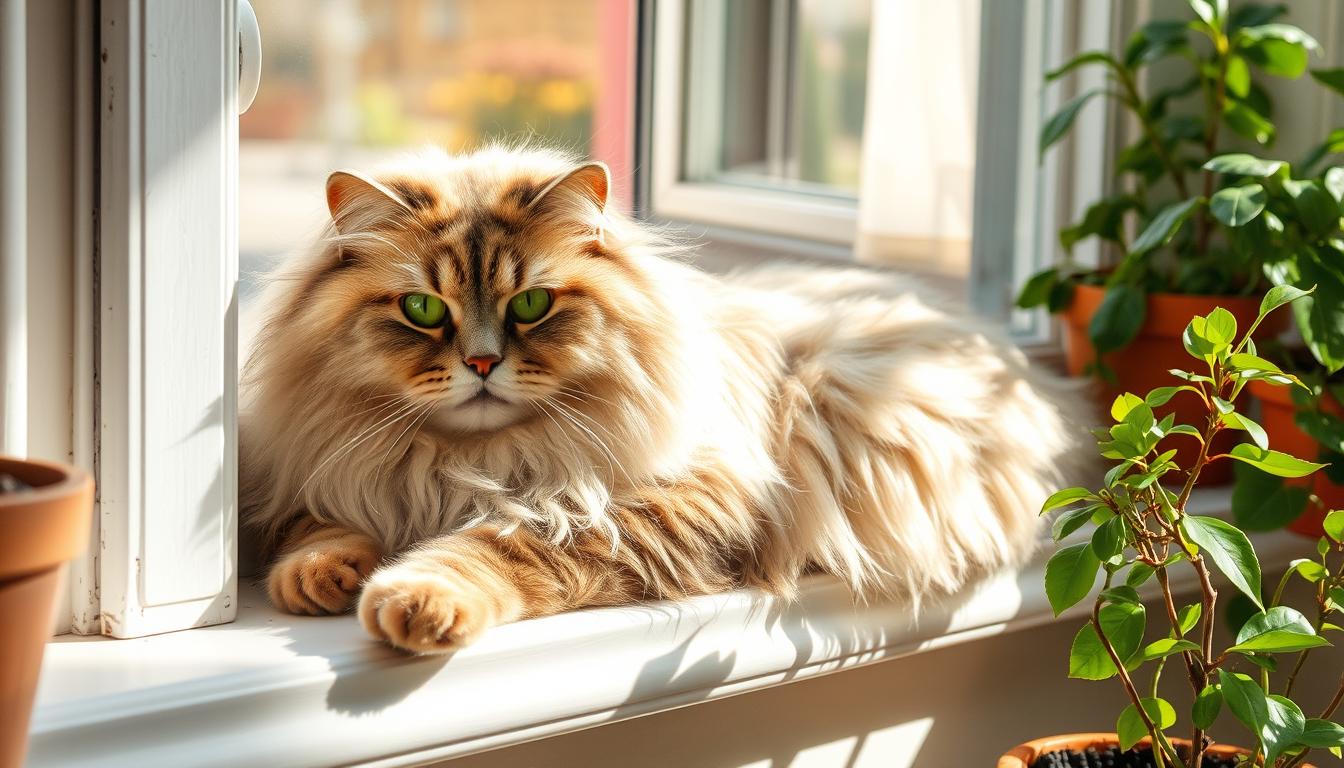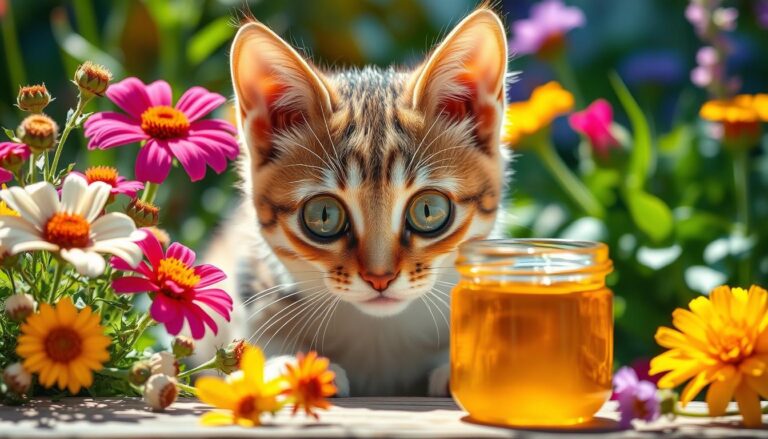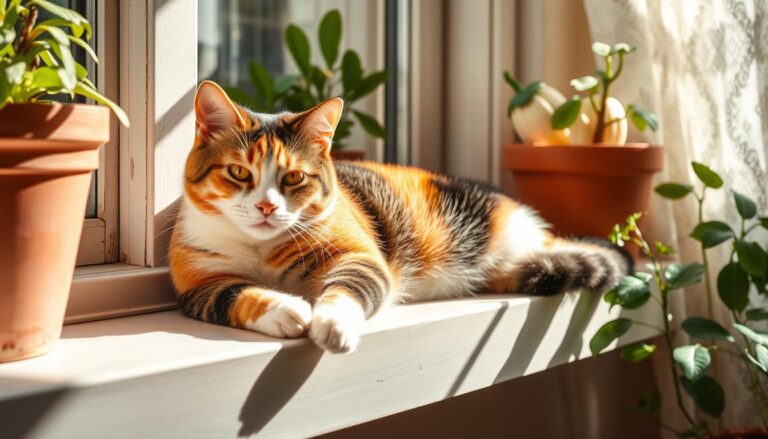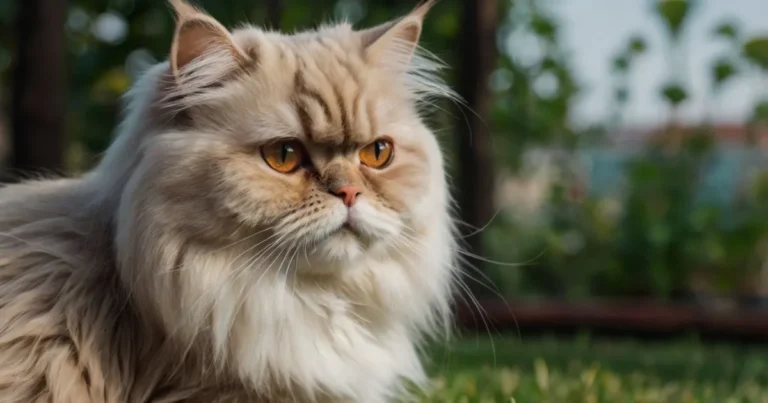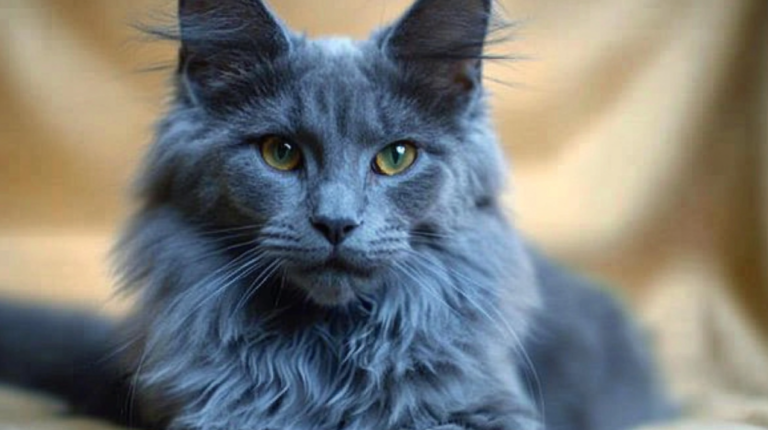Everything You’ll Adore About the Beautiful English Longhair Cat!
Looking at my British Longhair cat, I’m filled with joy. These cats have captured the hearts of people worldwide. They are known for their loving nature and majestic look. If you’re thinking of getting a cat, the British Longhair is a great choice.
Here’s a table providing an overview of the English Longhair Cat:
| Attribute | Details |
|---|---|
| Official Name | English Longhair |
| Common Name | English Longhair Cat |
| Pet Height | 10-14 inches (25-35 cm) |
| Pet Weight | 8-16 pounds (3.5-7.5 kg) |
| Lifespan | 12-18 years |
| Smartness Level | Moderate to High |
| Engagement in Play | Moderate |
| Human-Friendly | Very affectionate and gentle |
| Animal-Friendly | Generally friendly with pets if socialized early |
| Favorite Food | Dry and wet cat food, turkey, salmon |
Table of Contents
British Longhair: The Gentle Giant of Cat Breeds
The British Longhair is a standout in the world of cats. It’s a mix of the British Shorthair and the Persian cat. This creates a pet that is both fluffy and remarkable.

Unveiling the Origins of the British Longhair
The British Longhair was first bred in the 1960s. Breeders wanted a long-haired version of the British Shorthair. They mixed it with the Persian cat to get a cat with a soft coat and Persian-like face.
This mix made a cat that is graceful and elegant. It’s a true marvel of nature.
The Endearing Personality of the British Longhair
The British Longhair is known for being calm and friendly. These cats are easy-going and fit well into different homes. They are great companions for both children and other pets.
At first, they might be shy around new people. But they soon become affectionate. They love to cuddle and seek attention from their owners.
They are also good at adjusting to new places. This makes them great for families and individuals.
The British Longhair is truly a “gentle giant.” They win hearts with their regal looks and loving nature.
A Plush and Regal Appearance
The British Longhair has a regal elegance that’s hard to ignore. They share a muscular, compact build with the British Shorthair. Their sturdy, short legs and broad heads make them stand out.
They have full cheeks, a short nose, and a firm chin. This gives them a unique and charming look.
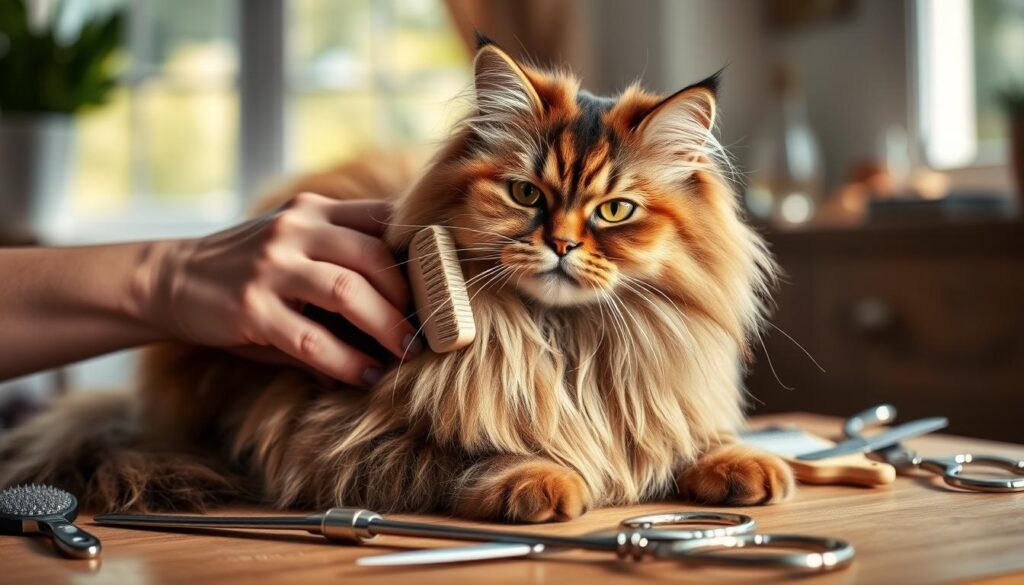
The Striking Physical Features of the British Longhair
Their eyes are truly captivating. These large, round orbs can be orange, blue, or green. Their thick, plush coat adds to their luxurious look.
They also have a thick collar and a fluffy tail. These features make them both powerful and graceful.
A Kaleidoscope of Colors and Patterns
Their coat comes in many colors and patterns. You can find them in solid colors like black, white, and blue. But it’s the patterns that really catch the eye.
From tabby stripes to calico and tortoiseshell, they offer endless variety. Whether it’s a pure white coat or a bicolor pattern, they’re a visual treat.
english long hair cat: A Breed for All Lifestyles
The British Longhair is a cat that fits well into many homes. They are famous for their serene and gentle nature. This makes them perfect for families and those who have lots of visitors.
Even though they are big, British Longhairs are great for apartment living. They don’t need a lot of space and can keep themselves busy. They also do well when their owners are away, making them perfect for people who travel a lot.
British Longhairs are not very active, but they love to spend time with their people. They are perfect for busy homes because they are happy to entertain themselves. Their calm and friendly nature makes them a great choice for any home.
| Breed | Adult Weight | Lifespan |
|---|---|---|
| British Longhair | 8-18 pounds | 12-16 years |
| Maine Coon | 9 to 20 pounds | 9 to 15 years |
| Norwegian Forest Cat | 12-16 pounds | 14-16 years |
| Persian | 8-15 pounds | 12-15 years |
The stats show that British Longhairs are adaptable and long-lived. This makes them a great choice for many homes and lifestyles.
Grooming Essentials for Your Fluffy Feline
Keeping Your British Longhair’s Coat in Pristine Condition
Grooming is key for a British Longhair, with their long, plush coats. They need to be brushed 2-3 times a week with a bristle brush. Do it gently and in small parts. They don’t need baths often, as they groom themselves well.
But, they can get hairballs because of their thick fur. So, brushing them often helps avoid this problem.
It’s important to pay extra attention to the fur around their rear and under their armpits. This is where mats can form easily. Consistent grooming helps your cat stay healthy and feeling great.
- Brush your British Longhair 2-3 times per week with a bristle brush
- Bathe your cat only when necessary, as they are skilled self-groomers
- Focus on areas prone to matting, such as the rear end and armpits
- Prevent hairballs by brushing your cat regularly to remove excess fur
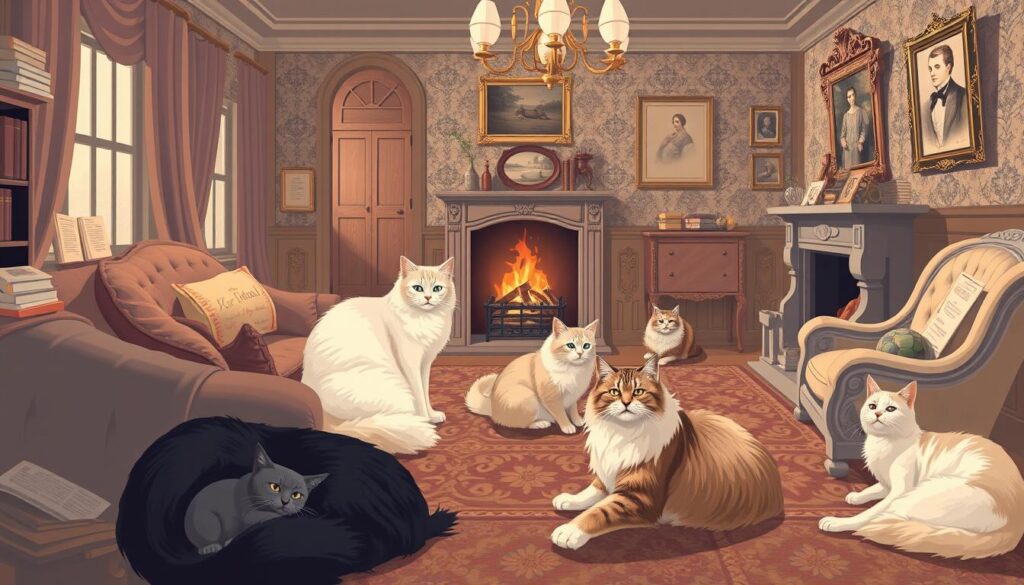
By following these british longhair grooming tips, you can keep your British Longhair’s cat coat care in top shape. This prevents cat brushing and cat bathing problems like hairball prevention.
Health and Wellness: Ensuring a Happy Life
The British Longhair is a majestic breed, but it comes with health concerns. It’s important to know about common issues and take steps to prevent them. This ensures your cat stays happy and healthy for a long time.
Navigating Potential Health Concerns
One big concern is obesity in British Longhairs. Their big size and love for food mean they need careful watching. Excess weight can lead to diabetes, joint pain, and breathing difficulties.
They might also get polycystic kidney disease and hypertrophic cardiomyopathy. These are serious conditions that breeders should check for. Regular vet visits and care are key to catching and managing these early.
| Health Concern | Description | Prevention and Management |
|---|---|---|
| Cat Obesity | A common issue due to the breed’s robust build and love of food, leading to various health problems. | Maintain a balanced diet, provide appropriate portion sizes, and encourage regular exercise. |
| Polycystic Kidney Disease | A genetic condition that can affect the kidneys, causing cysts to develop and potentially leading to kidney failure. | Responsible breeders will screen for this condition, and owners should ensure regular veterinary check-ups. |
| Hypertrophic Cardiomyopathy | A heart condition that can cause thickening of the heart muscle, potentially leading to heart failure. | Careful genetic screening by breeders and routine veterinary monitoring are essential for early detection and management. |
By being careful and working with your vet, your British Longhair can live a long, happy life. Frequent vet checkups, a nutritious diet, and regular exercise are essential. These steps help keep this amazing breed healthy and happy.
Tracing the Roots: The Fascinating History
The British Longhair is a captivating feline breed with a rich history. The breed traces its origins to the United Kingdom in the early 20th century. This breed is a mix of the British Shorthair and the elegant Persian cat.
Although it wasn’t officially recognized until recently, its history goes back further. Historical photographs show similar cats from the late 1800s.
The British Longhair’s unique longhair gene came from Persian and Turkish Angora cats. This careful mixing has created a cat with the British Shorthair’s build and the Persian’s coat.
Over time, the British Longhair has won the hearts of cat lovers everywhere. Its regal look and gentle nature make it a favorite pet. As it becomes more popular, its history and cultural ties add to its charm.
| Breed | Unique Features | Historic Significance |
|---|---|---|
| British Longhair | Stocky build, luxurious coat | Originated in the UK, result of crossing British Shorthair and Persian cats |
| British Shorthair | Affectionate, compact body | Likely descended from domestic cats introduced to Britain centuries ago |
| Persian Cat | Flowing, plush coat, gentle disposition | Historically associated with ancient Egyptian and Persian cultures |
The British Longhair’s path to recognition was slow but rewarding. Its unique heritage and traits have won it many fans. As it continues to enchant cat lovers, its story remains a captivating part of feline history.
The British Longhair as a Family Companion
The British Longhair is a great choice for families with kids. They are patient and loving, but they don’t like being picked up. It’s important to teach children to interact with them on the floor.
These cats are also friendly with other pets. But, it’s best to introduce them slowly and watch them closely. This helps everyone get along better.
British Longhairs are adaptable and social. They can live in many homes, as long as they get the love and care they need. They weigh between 8 to 16 pounds and live for 12 to 15 years.
Introducing Your Feline Friend to Children and Other Pets
Introducing your British Longhair to kids and other pets needs patience. Start by letting them watch from a distance. Use treats and kind words to reward their calm behavior.
Always watch when they meet for the first time. Teach kids to be gentle and not pull their fur or tail.
- Encourage children to play on the floor with interactive toys, allowing the British Longhair to approach at their own pace.
- Introduce new pets slowly, using scent swapping and controlled meetings to help your cat feel safe and secure.
- Provide your British Longhair with ample personal space, food, and litter box resources to minimize any territorial disputes.
With time and positive reinforcement, your British Longhair will become a cherished family member. They will bring joy to both children and other pets in the home.
Caring for Your British Longhair: A Comprehensive Guide
Taking care of your British Longhair cat is a big job. It involves giving them the right nutrition and keeping up with a regular grooming routine. Each part of their care is important to keep them healthy and happy.
Optimal Nutrition for Your British Longhair
British Longhair cats can easily gain too much weight. So, it’s key to feed them a high-quality, vet-approved diet. A diet full of protein, healthy fats, and vitamins and minerals helps keep them in top shape.
Grooming: Keeping the Coat in Pristine Condition
The British Longhair’s beautiful coat needs regular grooming to avoid matting and hairballs. Brushing them a few times a week helps remove loose hair and keeps their fur shiny. Sometimes, you might need to take them to a professional groomer for stubborn tangles.
Engaging Playtime and Mental Stimulation
British Longhair cats are smart and love to play. Giving them different cat toys and playtime keeps them entertained and active. It’s great for their general health.
Positive Training and Bonding
With patience and consistency, you can train your British Longhair cat to do simple things. This strengthens your bond with them. Using positive reinforcement, like clicker training, helps them learn new tricks and makes your relationship better.
| British Longhair Care Essentials | Key Considerations |
|---|---|
| Nutrition | High-quality, vet-approved diet to maintain healthy weight |
| Grooming | Regular brushing to prevent matting and hairballs |
| Playtime and Mental Stimulation | Engaging toys and activities to keep your cat entertained |
| Training and Bonding | Positive reinforcement techniques to strengthen the bond |
By focusing on these key areas of care, you can make sure your British Longhair cat is happy and healthy. They will live a full and joyful life with you.
Conclusion: The British Longhair, a Truly Remarkable Breed
The British Longhair is a remarkable breed. It combines the best of the British Shorthair and Persian cats. These cats are gentle, adaptable, and have a striking look.
They make great companions for many lifestyles. Whether you want a loyal family pet, a cuddly lap cat, or a low-maintenance friend, the British Longhair is a great choice.
If you’re attracted to their charm and willing to care for them, a British Longhair could be perfect for you. They live 15 to 20 years, showing loyalty, affection, and adaptability. They’re great for both new and experienced cat owners.
Choosing a cat breed, the British Longhair is unique. It has the British Shorthair’s sturdy build and the Persian’s regal look. If you’re looking for a cat that’s both beautiful and charming, consider the British Longhair.

